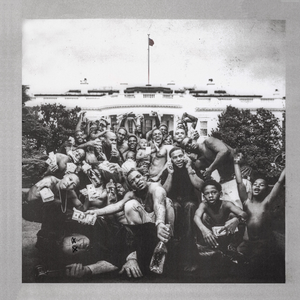
Artist: Kendrick Lamar
Album: To Pimp A Butterfly
Record Label: Aftermath/ Interscope
Release Date: N/A
Kendrick Lamar's latest full-length is both intensely creative and vitally distinct in its understanding of community, race and empowerment
There probably isn't another MC in mainstream hip-hop who can create a narrative as vividly as Compton's now world famous upstart Kendrick Lamar. His intensely powerful portrayal of growing up in suburban, poverty-stricken LA on 2012's 'Good Kid, Maad City' has lead to that album being upheld as a modern classic in many people's eyes; a rightfully deserved but semi-dangerous accolade that has condemned his third full-length 'To Pimp A Butterfly' to a serious amount of pressure.
Those approaching 'To Pimp A Butterfly' expecting more of the same as was on the previous album will be immediately thrown, both musically and lyrically. It speaks volumes about the kind of "mainstream" force Lamar is that despite achieving rigorous critical acclaim, his latest offering is probably his most left-field major release yet. The continuous concept of the record lyrically is a pivotal one, revolving largely around issues of race, pride, unity and self-identity both in a personal and universal sense. However, as we've come to expect, there are so many layers and so much content thrown in to many of the songs here that's both endlessly ambiguous as well as upholding a distinct ideology.
The Isley Brothers-sampling lead-off single 'i', on the album version, is a live performance cut short half way through by Lamar to deliver a righteous speech about equality. It's less about his mental health an d more about empowerment. It's a clever move with, in the hands of someone less capable, would have just come off as corny. On 'Institutionalized' he's "trapped inside the ghetto" and seems ashamed; Just like 'Money Trees' on "Good Kid..." it sees him longing to escape the double-edged life he experienced growing up. 'These Walls' is a funky, poetic and graphic re-living of a sexual encounter that at its mid-way point becomes a remorseful and cynical eye cast on the temptations Lamar's been offered by his new found life, and how empty they leave him feeling.
'U' is perhaps the most deranged and vulnerable Lamar has ever sounded. "Loving you is complicated" he wails as the song's chief refrain, and as it continues and he gets consistently more angry and helpless it becomes clear that he could be referencing a plethora of the issues he's had to deal with, from the President to alcoholism and his own depression. 'Momma' is about the importance of staying in touch with your roots no matter how far removed it seems you've become, and 'How Much a Dollar Cost?' unveils a sharp story about an encounter with a homeless person used as a metaphor for all the pot-holes in the constitutional and economic system, as well as the personal insensitivity wealth can inspire.
It's the sense of race and identity that carries the heaviest message of the record though, and three songs in particular epitomise this. 'King Kunte' is the album's pop song, an insatiably Mark Ronson-esque bass-driven funk lunge which sees Lamar identifying as the cult African-American hero (sample lyric: "Everybody wanna cut the legs off him... Black man taking no losses"). 'The Blacker the Berry' is a heroically fiery assault on racism and at a deeper level perhaps a slight hit at the more institutionalised aspects of it; "I'm as black as the heart of a fuckin' Ayreon". The monolithic 12-minute closer 'Mortal Man' could almost act as a summary for Lamar's entire moral persuasion and intended message. "Just because you wear different gang colours to me doesn't mean I can't respect you as a black man" he intones during a recital of the poetic monologue he drops in and out of throughout the album. The track ends on a mysteriously recorded conversation between himself and 2Pac, and serves as a final unifying and empowering note.
'To Pimp A Butterfly' is an imperative release for two primary reasons. Firstly, Lamar has increased his individuality rather than allowing it to be swallowed by record label tycoons who would have him imitate Big Sean. Secondly, for a mainstream rapper to appropriate and deliver race conviction as powerfully as Lamar does here gives one hope that not all commercially favoured rap is as flaccid as radio 1's daytime playlist.
8/10
Key Tracks: 'Momma', 'The Blacker The Berry', 'Mortal Man'
For Fans Of: Ab-Soul, Joey Bada$$, Flying Lotus
No comments:
Post a Comment